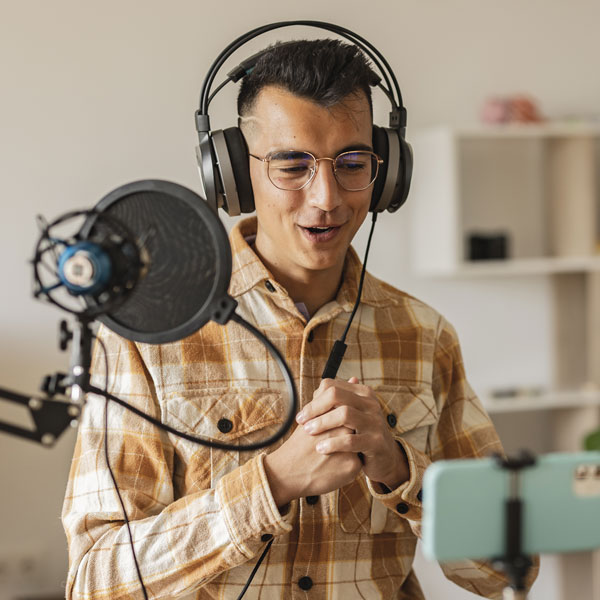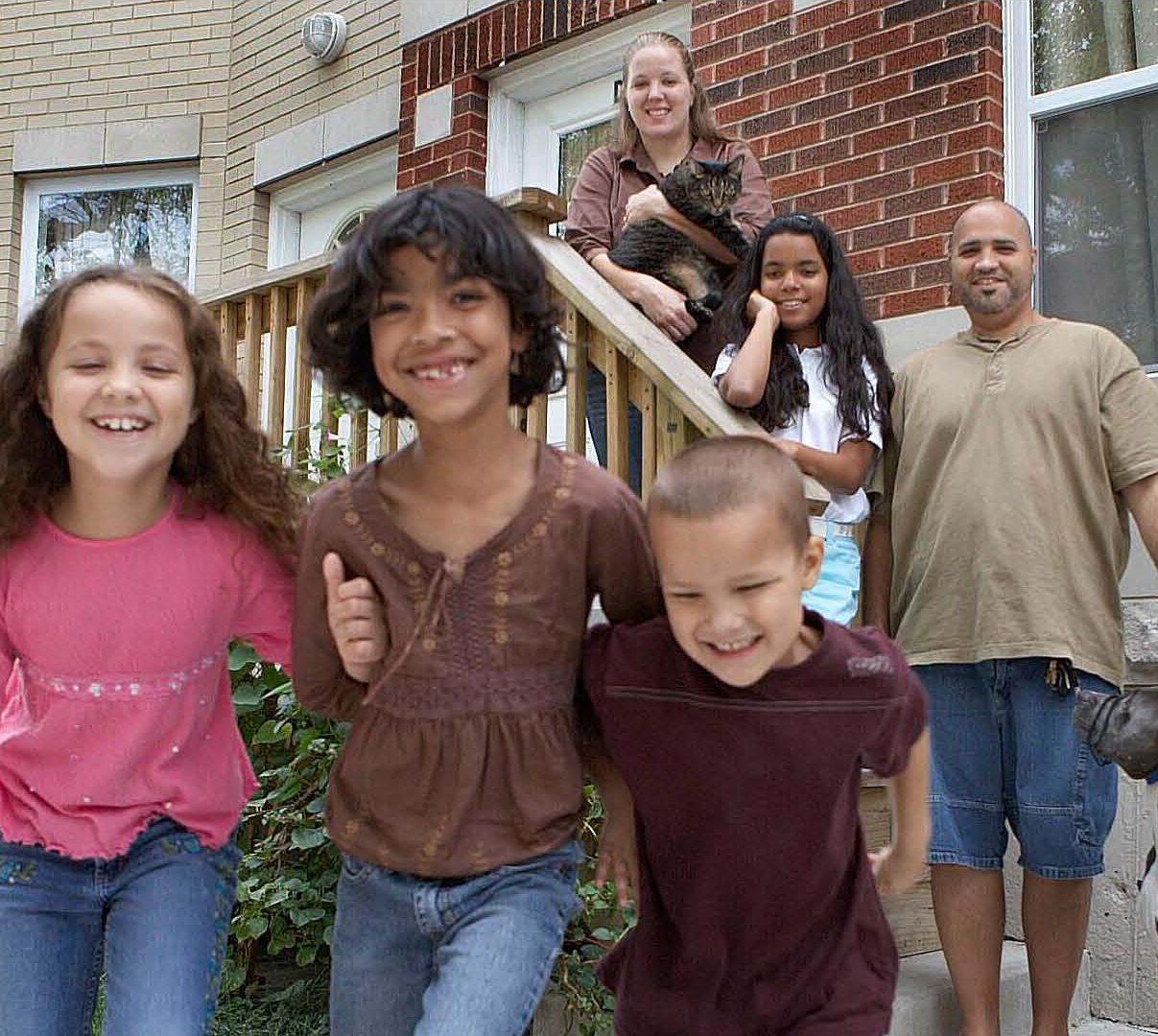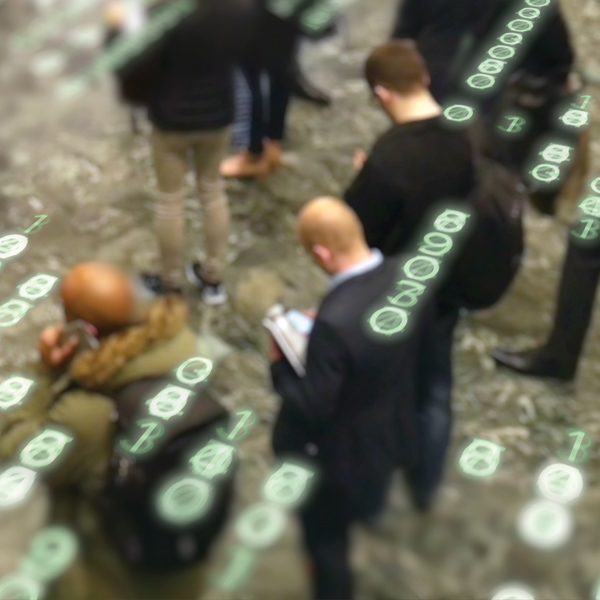Reflecting on our grantmaking in Chicago in 2023, Tara Magner discusses how we invested in Chicagoans shaping the region in a year of change.
In 2023, residents expressed their vision for the future of Chicago and shaped a year of significant change for the region. A new mayoral administration took office in May. Gun violence dropped by double digits from 2022, and the city strengthened its civilian oversight of the Chicago Police Department. Cash bail was eliminated across the state of Illinois. Residents called for equitable economic recovery from the pandemic and investment of federal dollars in our physical infrastructure.
MacArthur’s grantmaking touched these areas and many others. From hyperlocal journalism to grassroots climate justice initiatives to neighborhood-focused wealth building programs, MacArthur’s grantmaking and Impact Investments teams collaborated with local community leaders. Throughout, we supported resident-led initiatives to ensure Chicago advances toward being a just, verdant, and peaceful home for all who live here, awarding 110 grants totaling $42,140,400 million across our programs.
Chicago Commitment
After seeing spikes in gun violence during the COVID-19 pandemic, Chicago had a 13 percent decrease in shooting incidents in 2023. While this decrease is the result of a number of factors, we are proud of the work of Community Violence Intervention (CVI) organizations, which serve individuals at high risk of shooting or being shot with an array of services that include outreach, life coaching, trauma treatment, education, and job training. CVI is a key element of the Partnership for Safe and Peaceful Communities (PSPC), a 50-funder initiative co-founded by MacArthur and designed to decrease gun violence in Chicago. Established in 2016, PSPC has raised and deployed over $140 million to support programs focused on street level violence prevention, community-police relations, and reform of the policing system. The Chicago Commitment awarded just under $10 million in 2023 in multi-year commitments to PSPC programs.
A key element of PSPC is to support resident-led approaches to increasing community cohesion and building peace, such as gardening, mentoring, arts and culture, music festivals, youth sports programs, block clubs, and wellness activities. In 2023, through the PSPC Chicago Fund, over 250 grassroots initiatives in 24 communities received $2.5 million for neighborhood activities that create safe spaces and promote peace.
After creating the Community Commission for Public Safety and Accountability in 2021, Chicago took further steps toward community engagement in policing and public safety in 2023 by electing District Councils in each police district. A longtime grant recipient, the Grassroots Alliance for Police Accountability, educated voters on the role of the District Councils and will support these new entities as they help to build constructive relationships between police officers and residents.
To further the Chicago Commitment’s goal of advancing racial equity, MacArthur and the Field Foundation unveiled A Road Together (ART), a new funding partnership that supports Chicago’s small and medium-sized arts and cultural organizations with a strong commitment to equity. Both ART and Culture, Equity, and the Arts (CEA)—MacArthur’s grantmaking program that supports large arts organizations—use participatory processes rooted in power sharing and trust-based philanthropy to produce recommendations for grants. With an initial $15 million investment from MacArthur over five years, ART supports dozens of entities that emphasize racial equity, serve historically underfunded communities, and play a vital role in Chicago’s identity, economy, and social fabric. ART announced its first slate of 80 grant recipients in October, representing organizations with annual budgets under $1 million per year. MacArthur makes direct grants to organizations with budgets above that amount through its CEA program. We acknowledge and mourn the recent loss of Geoffrey Banks, Senior Program Officer, Chicago Commitment, who was instrumental and dedicated to advancing equity in and through the arts.
In addition, the Chicago Commitment refined its community economic development funding to amplify our impact by focusing more intensively in ten communities.
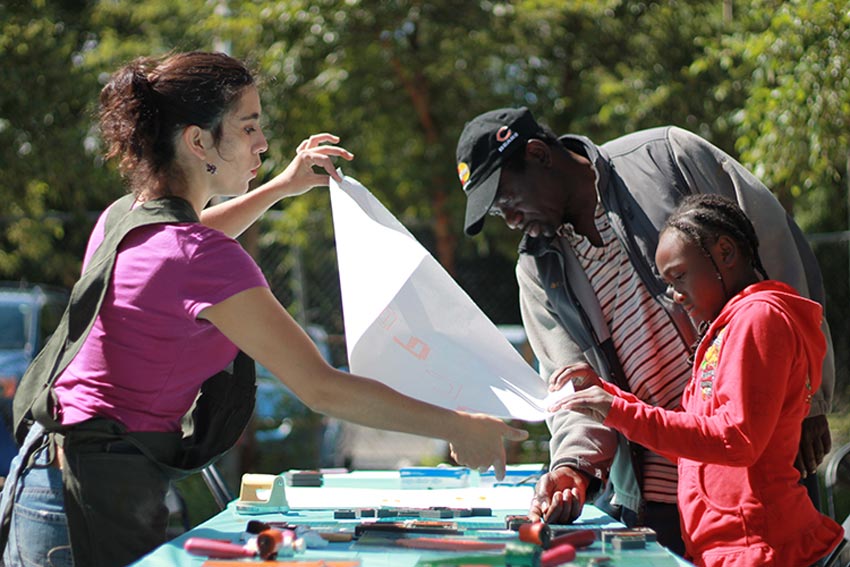
Artist Nuria Montiel, left, creates letterpress prints with visitors at Hyde Park Art Center.
Criminal Justice
2023 was a momentous year in criminal justice reform in Chicago and Illinois. After months of litigation, the Illinois Supreme Court ruled that the Illinois Pretrial Fairness Act is constitutional. The law took effect in September, eliminating cash bail across the state. Several organizations supported by MacArthur’s Criminal Justice program contributed to the growing body of evidence demonstrating that bail reform efforts are effective; they can preserve community safety while reducing the harms caused by incarceration. Moreover, as demonstrated by Loyola University’s Center for Criminal Justice, the elimination of cash bail in Cook County did not reduce public safety. Grants that supported effective implementation of the law include awards to the Cook County Justice Advisory Council and Metropolis Strategies’ Illinois Justice Project.
2023 was a momentous year in criminal justice reform in Chicago and Illinois.
Over the past several years, Cook County reduced its jail population by 30 percent and emphasized community engagement in programs that center equitable reform. The Illinois Justice Project’s Illinois Reentry Council supports equitable and effective processes for people returning to the community from jails and prisons. In addition, the Criminal Justice and Journalism and Media teams collaborated on grants to organizations working locally to generate greater transparency and public understanding of the workings of the legal system. These include support for Injustice Watch, which conducts in-depth reporting on equity and justice issues in the Illinois court system; Zealous, which through coalition-building, creates more accurate narratives on public safety in Cook County; and a grant to the Illinois Prison Project, which educates journalists about incarceration across the state.
Local News
In 2023, MacArthur announced our newest Big Bet focusing on Local News, essential for a thriving democracy. Across the nation, we have seen independent outlets suffer from a lack of resources or close down altogether. After announcing Press Forward, a national effort to bolster local news fueled by $500 million, MacArthur and its funding partners launched Press Forward Chicago. With nearly $10 million in initial commitments, Press Forward Chicago will make grants to independent news outlets in our region, revitalizing local news and helping to overcome longstanding inequities in coverage and practice. A parallel effort, Press Forward Springfield, will ensure that Illinoisans across the state have access to factual, independent journalism.
Journalism & Media
MacArthur’s Journalism and Media (JAM) program also continued to provide direct support to Chicago-area civic journalism and local outlets. In 2023, JAM supported True Star Media, a youth-focused journalism and film program, and The TRiiBE, which uses journalism, documentary, creative writing, and video to reshape the narrative of Black Chicago. In addition, through its ongoing partnership with the Field Foundation, JAM supports the Journalism and Storytelling Program with $1 million per year to deploy through regranting. This partnership amplifies the voices and impact of local storytellers as they celebrate culture, offer new perspectives, and report on the city’s inequities.
Climate Solutions
In 2023, the Climate Solutions and Chicago Commitment teams coordinated to bolster the city’s environmental justice movement. Since its founding in 2020, Chicago Environmental Justice Network has brought together neighborhood-based, grassroots organizations working in communities throughout the Chicago metropolitan area that face severe environmental and health disparities. A renewal award of $2 million to the Little Village Environmental Justice Organization (LVEJO), which hosts the Network, helps to build the capacity of frontline leaders who are addressing the air quality, water, climate change, environmental health, and conservation issues that directly impact the communities they serve. These organizations have won significant battles in recent years, successfully pressing to close coal plants, to ban petcoke in the city, and to prevent the relocation of an iron shredder facility. In addition to LVEJO, the Network includes Blacks in Green, Neighbors for Environmental Justice, People for Community Recovery, and Southeast Environmental Task Force.
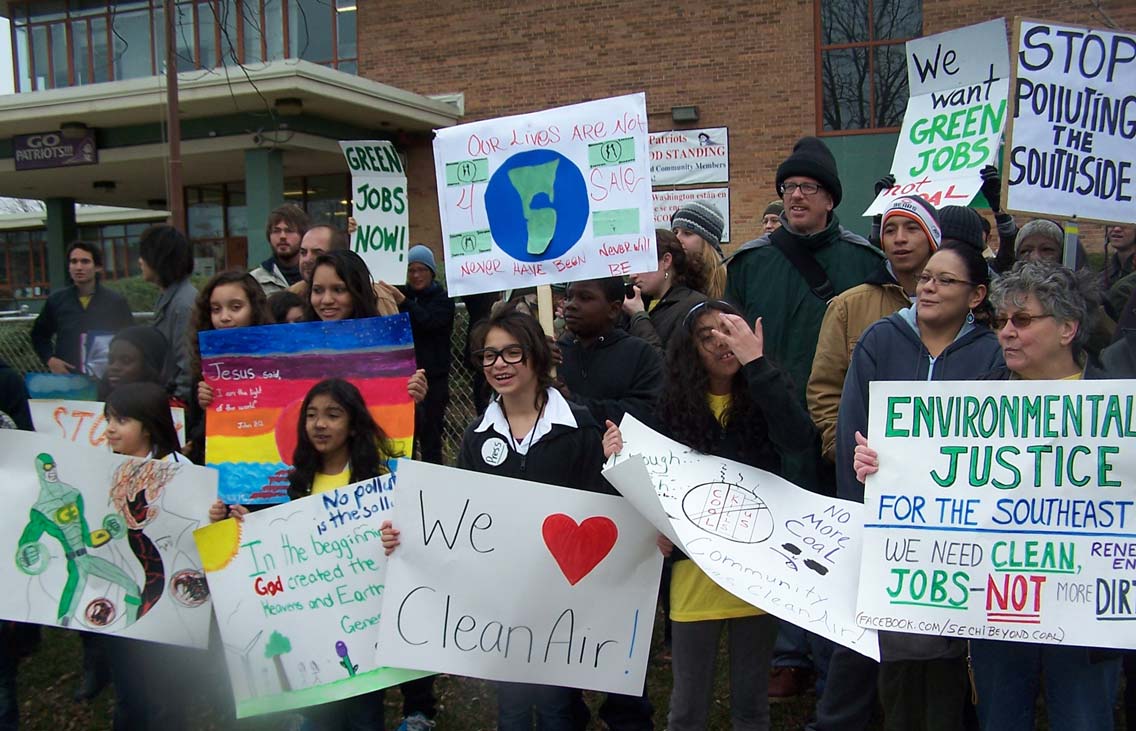
Members of the Southeast Environmental Task Force protest a coal gasification plant. They have been instrumental in preventing additional industrial projects from being built in the already heavily industrialized Southeast Side of Chicago. Credit: Southeast Environmental Task Force
In coordination with Climate Solutions, the Chicago Commitment team supported the Center for Neighborhood Technology to encourage the involvement of residents and community-based organizations in decision making around the deployment of federal infrastructure resources. Its projects include the placement of electric vehicle charging stations in Chicago and the consideration of new rapid bus transit corridors. A parallel award to Elevated Chicago, a project of the Chicago Community Foundation, builds the capacity of nonprofit organizations to compete for and implement Equitable Transit Oriented Development grants from the City of Chicago, awards that were made possible by federal pandemic recovery funding.
In a victory for public transit access, in September 2023, the federal government pledged just under $2 billion to extend the Red Line elevated train service 5.6 miles south of its current termination on Chicago’s South Side, creating new public transportation options for approximately 100,000 residents. Many MacArthur grant recipients supported initiatives like these to ensure that the influx of federal funds are distributed equitably across the Chicago metropolitan region.
Impact Investments
To support community economic development and the building of local wealth in Chicago neighborhoods, the Impact Investments and Chicago Commitment teams collaborated on a $2 million program-related investment in the newly formed Chicago TREND Real Estate Fund LP. This investment supports redeveloping existing neighborhood shopping centers in Chicago that experienced disinvestment. TREND employs a new ownership model that blends private equity with community ownership. An award to ResilNC helps local business owners to reap the benefit of property ownership, thereby building wealth and preventing displacement. These initiatives create pathways for community residents and entrepreneurs to build wealth by investing directly in real estate development projects in the neighborhoods where they live and work.
These initiatives create pathways for community residents and entrepreneurs to build wealth.
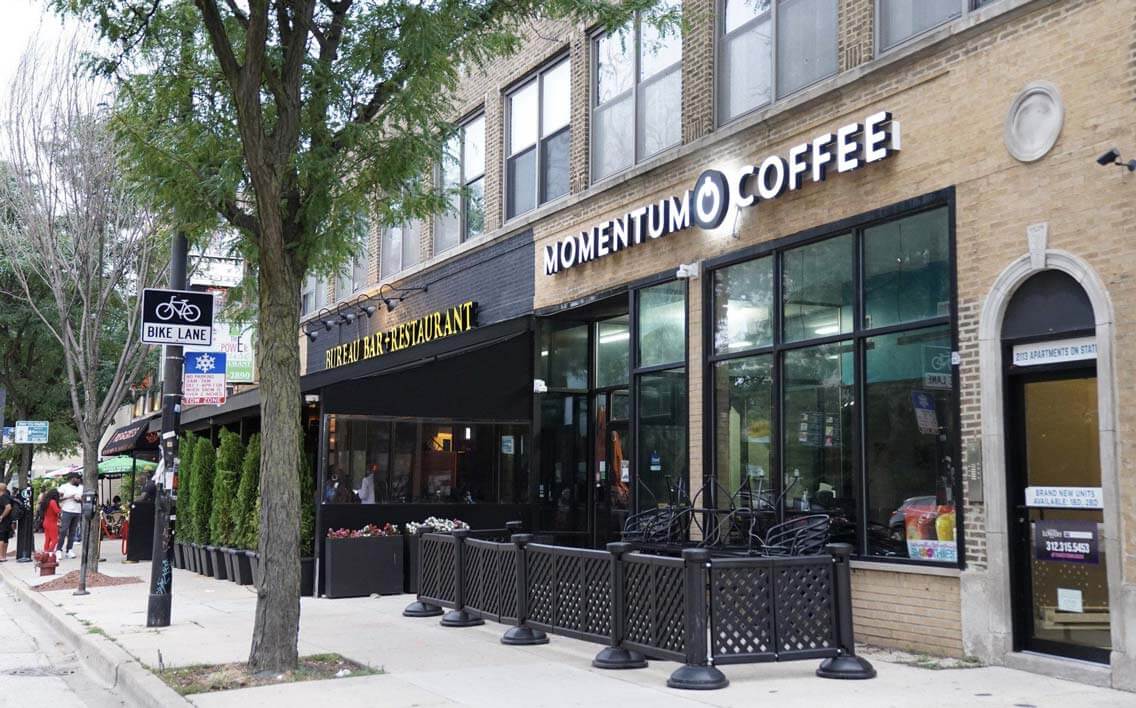
The Chicago TREND Real Estate Fund LP supports the redevelopment of shopping centers that have experienced disinvestment through a unique model that blends private equity with community ownership. Pictured: A revitalized shopping area in South Loop with a new coffee shop tenant. Credit: Chicago TREND
The Impact Investments team also continued to deploy capital to advance the Benefit Chicago initiative, a collaboration with Calvert Impact Capital and the Chicago Community Trust, increasing our total overall commitments to just over $110 million. In addition, the Impact Investments team supported an equitable small business ecosystem in Chicago through its ongoing awards to P33’s TechRise, the Fund for Equitable Business Growth, and Founders First Community Development Corporation.
Technology in the Public Interest
2023 was also the year of the emergence of generative artificial intelligence (AI) on the global stage. AI-related technologies can introduce new risks and harms that often disproportionately impact marginalized people and communities. The Technology in the Public Interest (TPI) team supported the ACLU of Illinois’ Privacy, Technology, and Surveillance project, which protects biometric information in Illinois; works to end the use of discriminatory automated predictive technologies in the Illinois criminal legal and child welfare systems; and explores new policy questions raised by generative AI.
With support from the TPI team, the Grassroots Preventing Surveillance (GPS) Network, based at the Crossroads Fund, addresses how historically marginalized communities in Chicago experience surveillance, including in policing, health care, housing, and education. The GPS Network is cultivating a strong organizing ecosystem and advancing community-centered policy reforms to overcome the harms emerging from the deployment and use of surveillance technologies in Chicago.
Special Grants
Finally, as in 2022, we made several special grants to assist Chicago and the State of Illinois to welcome and integrate asylum seekers and other migrants to our communities. These funds, totaling over $3 million in 2023, supported shelter, humanitarian relief, legal assistance, and coordination between government agencies and nonprofit organizations.
Conclusion
Each year, as we reflect on MacArthur’s work in the Chicago metropolitan area, we look to local leaders for advice and guidance and strive to respond to their vision for the city. We support them and elevate their voices as they design and carry out initiatives that serve all Chicagoans. We continue this work with our sincere gratitude to all who are joining hands to advance creativity, prosperity, and peace in our city.






